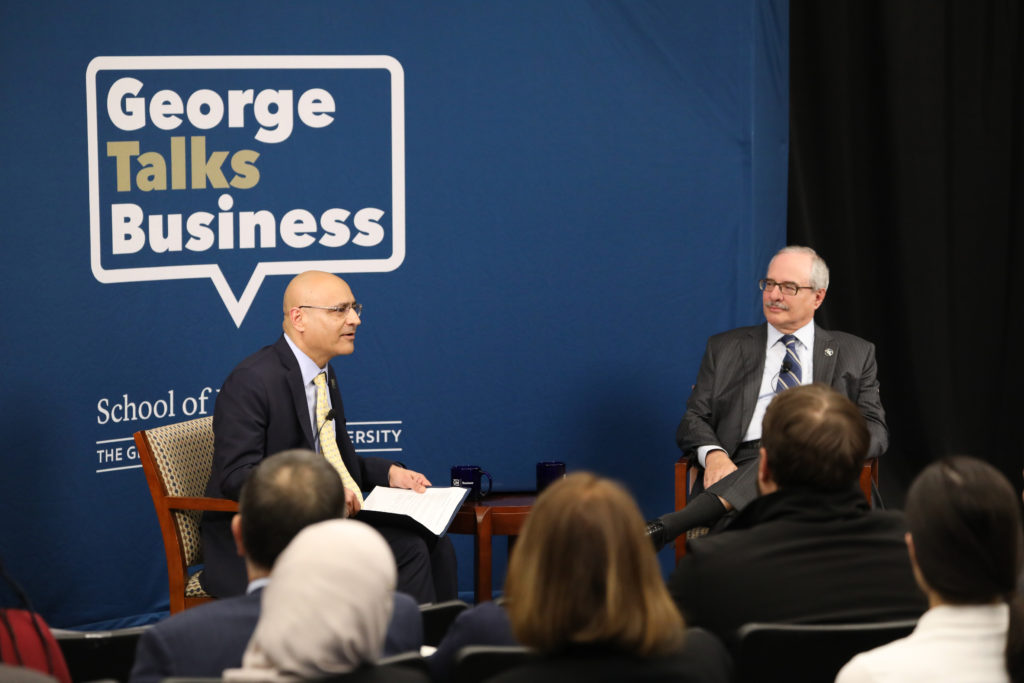Updated: May 13, 2019 at 5:07 p.m.
A new speaker series in the School of Business highlighted the school’s ties to the business world and boosted its visibility on social media in its first semester, officials said.
Administrators concluded the inaugural series of George Talks Business – 15 interviews between business school professors or officials and business professionals – with a conversation featuring International Monetary Fund Managing Director Christine Lagarde earlier this month. Officials said the series, which will continue next semester and may feature summer events, boosted the business school’s reputation by showcasing the expertise and experience of faculty.
University spokesman Jason Shevrin said Leo Moersen, the associate dean for undergraduate programs, devised the series as a method for industry professionals to share knowledge with the business school community. Vivek Choudhury, the outgoing associate dean for strategic initiatives, helped to develop the concept for the project through its first series.
“The ‘George Talks Business’ series was conceived as an information-sharing vehicle to showcase the scope, depth and breadth of GWSB’s expertise in business and business education, both within the wider GWSB community – students, faculty, staff, and especially alumni – as well as with the outside world,” he said in an email. “It’s proven to be an effective, informative and entertaining initiative.”
The series kicked off this semester with a conversation between University President Thomas LeBlanc and business school Dean Anuj Mehrotra. The events are part of Mehrotra’s initiative to prioritize student and alumni engagement with the business school community, which has also included the launch of an online happy hour to connect alumni and online students through video chats.
Shevrin said several of the events attracted more than 2,000 online views and large in-person audiences. Recordings of the conversations are available on the business school’s website and YouTube channel.
“‘George Talks Business’ has consistently drawn respectable in-person audiences, and on occasion, near-capacity crowds,” he said.
Shevrin added that the events helped the school grow its social media audience by more than 100 new subscribers to the school’s YouTube channel and more than 300 new followers on the school’s Facebook page.
He said none of the 15 speakers were paid to appear, but each received an “inexpensive” gift like GW-branded apparel.
Participants in the speaker series said the events helped the speakers promote their research and connected industry executives with the business school community.
Donna Hoffman, a professor of marketing and the co-director of the Center for the Connected Consumer – the business school’s marketing research collaborative – spoke at one of the conversations in February about changes in technology.
She said the series was an “exciting” way to inform the large virtual audience about the work research faculty conduct outside the classroom.
“I understand that a lot of people watched the video on Facebook, so that means the benefits extend beyond our students here on campus to the broader GW community and even beyond,” Hoffman said in an email.
Jennifer Vey, a senior fellow with the Metropolitan Policy Program at the Brookings Institute, said her appearance on campus in March helped her promote her research about innovation districts, a real estate strategy that aims to develop underperforming downtown areas through job opportunities and redesigned neighborhoods.
She said the series was an opportunity for her to unveil her findings to more students, faculty and others by reaching a virtual audience in addition to the in-person interview.
Chris Leinberger, a research professor and chair of GW’s Center for Real Estate and Urban Analysis, interviewed Vey and Gabriel Galvan, the executive director of The MITRE Corporation, a nonprofit organization that provides technical guidance to the federal government. He said many of the events centered around “cutting-edge” research topics, which can start a conversation that inspires students and faculty to learn more.
Leinberger said after Vey’s talk, a student’s question about applying her research to Foggy Bottom led the researchers to revisit their analysis and make the final presentation of their research more comprehensive.
Danny Leipziger, a professor of international business, said his interviews of Lagarde, the IMF director, and Kristalina Georgieva, the chief executive officer of the World Bank, underscored the high-profile connections the business school can draw upon.
“If you’re looking around Washington at the U.S. administration, the top three jobs are the head of the fed, the head of the World Bank and the head of the IMF, so anytime we can get people of that caliber to come and talk to our students, it’s a big plus,” he said.
He added that students’ “perceptive” questions demonstrated their intelligence and knowledge of the business industry to the guests on the series.
“They showed both the head of the bank and the head of the IMF that our students were thinking about global issues in a very sophisticated way,” he said.
The post was updated to reflect the following correction:
The Hatchet incorrectly reported that Vivek Choudhury developed the idea for the speaker series while he served as the interim dean of the business school. He helped conceptualize the project during its first season as the associate dean for strategic initiatives. We regret this error.





